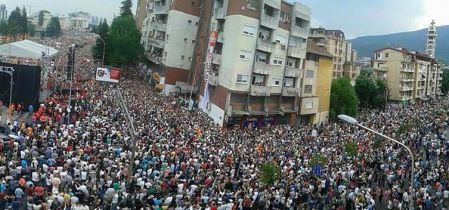
At least 100,000 protesters took to the streets on May 17th sporting crimson banners and flags of all nationalities. There would likely have been more had the Macedonian government not blocked buses of protesters streaming from all over the country to Skopje.

The demonstration resembled a people’s festival, in contrast to previous protests, which had faced heavy police repression. This time around, the power balance was obvious. Had the state confronted the movement openly it would have signed its own death sentence.
Despite this, there were no major developments. Negotiation talks are being held among the four major political parties to resolve the political crisis, to find a solution under the patronage of the European Union.
The SDSM (Social Democratic Union of Macedonia) opened a Pandora’s box with their leaks, and now the “international community” is stepping in, trying to find a harmless solution (harmless from the perspective of international capitalism) that will give the workers and poor the illusion that something has fundamentally changed for the better, in order to appease the movement. The outcome will most likely be determined by pressure from the EU and the US.
Even though nothing concretely came out of this protest, it does not mean that the movement is over, and it does not change the fact that at least 100,000 people took to the streets of Skopje. This shows that the molecular process towards revolution has entered a new critical stage in Macedonia.
The sense of apathy that ordinary people had is a long time gone. It had been so deep that there was no significant reaction to the worsening situation for a long time. Journalists of state television have admitted bluntly that their work is openly controlled in detail by the highest authority. The media have been reduced to populism and quick political points, while at the same time the everyday lives of workers and poor are becoming more and more unbearable.
The rulers have been less and less interested in even maintaining an appearance of representing the people. Distrust of politicians – both incumbent and in opposition – is so widespread that there is no political trust left to lose. The entire purpose of the government in their budget drafts have been to, in an undisturbed manner, strengthen their power and increase their private wealth. And why would it be in any other way? Sitting politicians remain incumbent despite zero popular support, because the base of their power rests not on popular support, but in their ability to maintain a system of clientelism.
It is not an issue of the Macedonian ruling class lacking any sense of shame – no ruling class around the world does. The case here is that these gangsters have been left unopposed by any kind of independent working class organisations. In Macedonia, as in many other countries around the world, bourgeois democracy is exposed for what it truly is – a means for gangsters to enrich themselves upon the blood and sweat of the working class – and it manifests itself here in its most naked form.
Some argue that western imperialists are behind these stormy events in Macedonia. According to such theories, it can all be reduced to a clash of interests between rival imperialisms – that of the West and of Russia in the construction of a Turkish Stream pipeline, which is to connect gas from Russia through Turkey, Greece, Serbia and Hungary to Austria.
It is implied that the interests of these imperialist powers are represented in Macedonia by the two major parties. That the VMRO represents the interests of Russia and SDSM those of the West. Even if it was true, and it might as well be, the SDSM is not pursuing the interests of the people, they are just the other side of the coin, and the same type of thugs as VMRO.
But by restricting one’s view and analysis of the situation and reducing it to power games by imperialist powers, one risks completely missing the point. We must not mechanically apply the lessons learned in Ukraine with the Maidan movement onto an entirely different situation, where the interests of the imperialists again clash. It is not our job to weigh one imperialist power against another in their war for markets and pick a side or none. Our only concern is the only war that matters – the class war.
The facts remain that national divisions have been erased by a massive upsurge in the class struggle against everything that is rotten in Macedonia, which has so far culminated in over 100,000 people in a country of two million taking to the streets.
This kind of movement cannot be conjured out of thin air or be the result of shady imperialist manipulations. This movement draws its strength from long accumulated frustration and anger that has finally found an outlet.
Even if the establishment finds a way to defuse this situation, nothing will have fundamentally changed – except for the experiences and lessons the working class will be drawing from these events. The objective conditions will remain the same and there is nothing the ruling class can do about it.
The mass movement is outraged at the ruling clique’s corruption and may even succeed in overthrowing the government, like it happened in neighbouring Bulgaria in February 2013 and again in July 2014; but the existing opposition parties are not willing to overthrow the existing system and will not be able to solve any of the fundamental problems.
It is not fundamentally a question of reducing the amount of corruption or choosing a lesser evil in order to solve the problems facing the mass of the population. It is the capitalist system which has failed to give the majority of the population a viable future.
The mass movement in Bulgaria rapidly drew extremely radical conclusions, demanding: the dismissal and expropriation of the whole oligarchy, which has usurped and plundered the country’s wealth; the renationalisation of all that had been privatised and stolen; and the need to impose some sort of control over the economy by the people themselves. All these questions were raised by the mass mobilisations in Bulgaria and will be raised by the Macedonian masses too, but cannot be resolved until a revolutionary leadership is given to the mass movement and an open break with capitalism is made.

